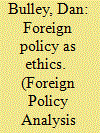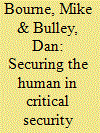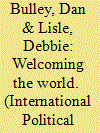|
|
|
Sort Order |
|
|
|
Items / Page
|
|
|
|
|
|
|
| Srl | Item |
| 1 |
ID:
131061


|
|
|
|
|
| Publication |
2014.
|
| Summary/Abstract |
This article notes that while ethics is increasingly talked of in foreign policy, it remains a blindspot for foreign policy analysis (FPA). It argues that this must be rectified through a critical approach which conceptualizes foreign policy as ethics. The first section examines how even constructivist approaches, which are highly attuned to the intersubjective sphere, still generally avoid dealing with morality. The second section looks at the possibilities and limits of one piece of constructivist theorizing that explores the translation of morality into foreign policy via "norms." This demonstrates the problems that a constructivist account, with its tendency toward explanatory description without evaluation, will always face. The final section argues, through an examination of EU foreign policy (from 1999 to 2004) and its innovative use of "hospitality," that FPA must critically reassess the value of the norms and principles by which foreign policy operates in order to suggest potentially more ethical modes of encounter.
|
|
|
|
|
|
|
|
|
|
|
|
|
|
|
|
| 2 |
ID:
127805


|
|
|
|
|
| Publication |
2014.
|
| Summary/Abstract |
Refugee camps are increasingly managed through a liberal rationality of government similar to that of many industrialized societies, with security mechanisms being used to optimize the life of particular refugee populations. This governmentality has encompassed programmes introduced by the United Nations High Commissioner for Refugees (UNHCR) and various non-governmental organizations (NGOs) to build and empower communities through the spatial technology of the camp. The present article argues that such attempts to 'govern through community' have been too easily dismissed or ignored. It therefore examines how such programmes work to produce, manage and conduct refugees through the use of a highly instrumentalized understanding of community in the spatial and statistical management of displaced people in camps. However, community is always both more and less than what is claimed of it, and therefore undermines attempts to use it as a governing tactic. By shifting to a more ontological understanding of community as unavoidable coexistence, inspired by Jean-Luc Nancy, we can see how the scripting of and government through community in camps is continually exceeded, redirected and resisted. Ethnographies of specific camps in Africa and the Middle East enable us both to see how the necessary sociality of being resists its own instrumentalization and to view the camp as a spatial security technology. Such resistance does not necessarily lead to greater security, but it redirects our attention to how community is used to conduct the behaviour of refugees, while also producing counter-conducts that offer greater agency, meaning and mobility to those displaced in camps.
|
|
|
|
|
|
|
|
|
|
|
|
|
|
|
|
| 3 |
ID:
074799


|
|
|
|
|
| Publication |
2006.
|
| Summary/Abstract |
David Campbell has been at the forefront of showing how deconstruction, and the philosophy of Jacques Derrida, can help us to think international relations differently. Like Derrida himself, Campbell has eschewed the goal of an ethical theory in favour of an 'ethos of political criticism' concerned to question and go beyond our assumptions and limits. In order to continue such an ethos of criticism, to push our understanding of ethics in international relations further still, it is surely important to question the assumptions and limits Campbell himself imposes. It is with this in mind that I wish to take a particular political intervention by Derrida in 1993 and read it against Campbell's Derridean analysis of the Bosnian conflict which began in 1992.
|
|
|
|
|
|
|
|
|
|
|
|
|
|
|
|
| 4 |
ID:
108671


|
|
|
|
|
| Publication |
2011.
|
| Summary/Abstract |
This article argues that Critical Security Studies (CSS), exemplified by Ken Booth's Theory of World Security, has outlined an ethics of security as emancipation of the 'human', but also a highly problematic security of ethics. After drawing out how the ethics of CSS operates, we examine the security of this ethics by examining it against a hard case, that of the 1998-99 Kosovo crisis. Confronting this concrete situation, we draw out three possibilities for action used at the time to secure the human: 'humanitarian containment', military intervention and hospitality. Assessing each against Booth's requirements for ethical security action, we counter that, in fact, no option was without risks, pitfalls and ambiguities. Ultimately, if any action to promote the security and the emancipation of the human is possible, it must embrace and prioritise the fundamental insecurity of ethics, or else find itself paralysed through a fear of making situations worse.
|
|
|
|
|
|
|
|
|
|
|
|
|
|
|
|
| 5 |
ID:
114113


|
|
|
|
|
| Publication |
2012.
|
| Summary/Abstract |
London's successful bid for the 2012 Olympic Games presented a diverse, cosmopolitan city opening its arms and "welcoming the world." This article explores the apparently benign gesture of hospitality contained in London's official candidature files submitted in 2004 and asks how such a promise of inclusiveness is managed. We argue that London's depiction of itself as hospitable to every kind of visitor relies on subtle techniques of governmentality in which the subject positions of "host" and "guest" are imagined and produced in ways that make them more governable. By this, we are not referring to acts of authority, coercion, or discipline that exclude subjects or render them docile bodies within a rigid panoptical city. Rather, we are referring to the delicate ways in which the official bid document imagines and produces the ideal subject positions of host and guest and in so doing enables, encourages, and incentivizes certain behaviors. This analysis of urban welcoming takes us beyond reductive oppositions of hospitality and hostility, inclusion and exclusion, self and other. It focuses instead on how London's inclusive welcome produces a variety of host and guest positions (for example, the "Olympic Family," volunteers, guest workers), segregates them within the city, and then "conducts their conduct" in the areas of planning, security, transport, accommodation, education, and training. By analyzing the techniques of governmentality at work in London's 2004 bid document, this article foregrounds the enabling form of power driving the city's inclusive welcome and exposes its inherent micropolitics.
|
|
|
|
|
|
|
|
|
|
|
|
|
|
|
|
|
|
|
|
|